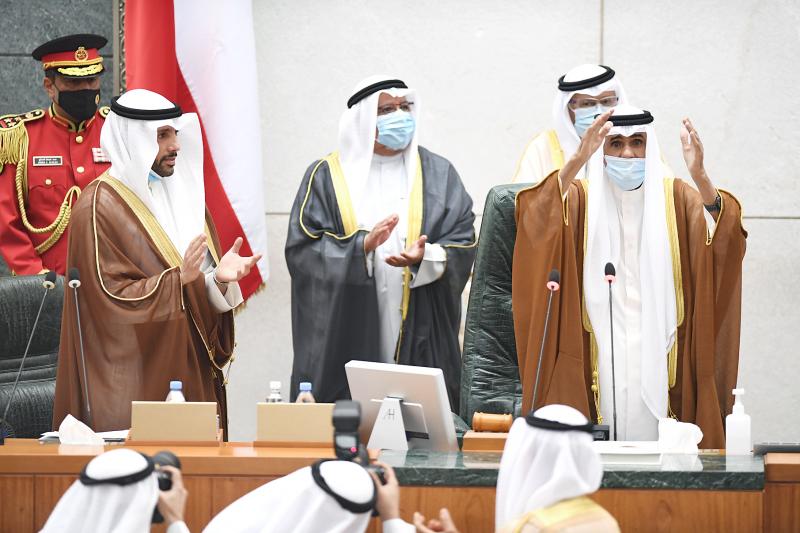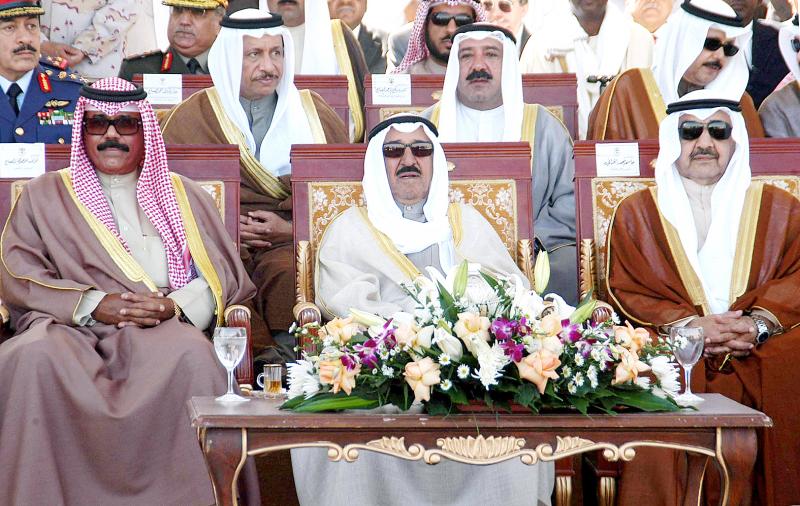Sheikh Sabah Al Ahmad Al Sabah, the ruler of Kuwait who drew on his decades as the oil-rich nation’s top diplomat to push for closer ties to Iraq after the 1990 Gulf War and solutions to other regional crises, died on Tuesday. He was 91.
Crown prince Sheikh Nawaf Al Ahmad Al Sabah, his 83-year-old half brother, was yesterday sworn in as the new emir.
In a Middle East replete with elderly rulers, Sheikh Sabah stood out for his efforts at pushing for diplomacy to resolve a bitter dispute between Qatar and other Arab nations that continues to this day.

Photo: EPA-EFE
His 2006 ascension in Kuwait, a staunch US ally since the US-led war that expelled occupying Iraqi troops, came after parliament voted unanimously to oust his predecessor, the ailing Sheikh Saad Al Abdullah Al Sabah, just nine days into his rule.
Yet as Kuwait’s ruling emir, he struggled with internal political disputes, the fallout of the 2011 Arab Spring protests and seesawing crude oil prices that chewed into a national budget providing cradle-to-grave subsidies.
“He represents the older generation of Gulf leaders who valued discretion and moderation, and the importance of personal ties amongst fellow monarchs,” said Kristin Diwan, a senior resident academic at the Arab Gulf States Institute in Washington who studies Kuwait. “No question he has suffered from the lack of deference and respect shown by the younger and more brash young princes holding power today.”

Photo: AFP
State television announced his death after playing Koranic prayers, with Royal Court Minister Sheikh Ali Jarrah Al Sabah reading a brief statement, his hands shaking.
“With great sadness and sorrow, the Kuwaiti people, the Arab and Islamic nations, and the friendly peoples of the world mourn the death of the late His Highness Sheikh Sabah Al Ahmad Al Jaber Al Sabah, emir of the state of Kuwait who moved to the realm of the Lord,” Sheik Ali Jarrah said, without offering a cause of death.
The high regard for Sheikh Sabah could be seen in the outpouring of support for him across the Middle East after he suddenly fell ill in July, leading to a quick hospitalization and surgery in Kuwait City amid the ongoing COVID-19 pandemic. Authorities did not say what ailed him.
A US Air Force C-17 flying hospital then transported Sheikh Sabah from Kuwait to Rochester, Minnesota, home of the flagship campus of the Mayo Clinic — an extraordinary gesture by the US government for a foreign head of state.
The Mayo Clinic did not immediately respond to requests for comment.
Sheikh Sabah’s life spanned two very different Kuwaits. He was born on June 16, 1929, just as the country’s pearl-diving industry would collapse. Within the decade, Kuwait would strike oil. Engineers would eventually confirm that the tiny country, slightly smaller than the US state of New Jersey, had the world’s sixth-largest known oil reserves.
Sheikh Sabah became Kuwait’s foreign minister in 1963 after holding a number of other government posts. He would remain in that position for four decades, making him one of the world’s longest-serving foreign ministers.
His country’s greatest crisis came in 1990, when then-Iraqi president Saddam Hussein invaded Kuwait and occupied the nation for seven months.
Fleeing with other Kuwaiti officials to neighboring Saudi Arabia, Sheikh Sabah collapsed and lost consciousness at one particularly stormy meeting of Arab leaders.
On Feb. 24, 1991, US troops and their allies stormed into Kuwait. It ended 100 hours later.
The US suffered only 148 combat deaths during the whole campaign, while more than 20,000 Iraqi soldiers were killed.
Even before the US entered Kuwait, Sheikh Sabah and others began suggesting a permanent US presence in the region might provide them protection from Iraq and others.
“One learns from the past and learns about it for the future,” Sheikh Sabah reportedly said. “One has to consider arrangements that would make not only my country stable but make the whole area stable.”
Today, Kuwait hosts about 13,500 US troops, many at Camp Arifjan south of Kuwait City, which is also home to the forward command of US Army Central.
In 2003, his half brother and Kuwait’s then-emir, Sheikh Jaber Al Ahmad Al Sabah, named Sheikh Sabah as prime minister.
Although the move kept members of the Al Sabah family firmly in control of Kuwait, it was seen as a modest step toward reform, as it marked the first time that the roles of prime minister and crown prince were split.
It also formalized Sheikh Sabah’s role in running the daily affairs of the country — a responsibility he had increasingly assumed while the former prime minister, Sheikh Saad, struggled with health problems.
Despite those health problems, Sheikh Saad took power in 2006 after the death of Sheikh Jaber. Concerns mounted during his brief reign as he was seen in public only in a wheelchair and did not speak.
Parliament ended up voting 64-0 to have Sheikh Sabah become emir, following a similar Cabinet decision.
Additional reporting by Reuters

Airlines in Australia, Hong Kong, India, Malaysia and Singapore yesterday canceled flights to and from the Indonesian island of Bali, after a nearby volcano catapulted an ash tower into the sky. Australia’s Jetstar, Qantas and Virgin Australia all grounded flights after Mount Lewotobi Laki-Laki on Flores island spewed a 9km tower a day earlier. Malaysia Airlines, AirAsia, India’s IndiGo and Singapore’s Scoot also listed flights as canceled. “Volcanic ash poses a significant threat to safe operations of the aircraft in the vicinity of volcanic clouds,” AirAsia said as it announced several cancelations. Multiple eruptions from the 1,703m twin-peaked volcano in

A plane bringing Israeli soccer supporters home from Amsterdam landed at Israel’s Ben Gurion airport on Friday after a night of violence that Israeli and Dutch officials condemned as “anti-Semitic.” Dutch police said 62 arrests were made in connection with the violence, which erupted after a UEFA Europa League soccer tie between Amsterdam club Ajax and Maccabi Tel Aviv. Israeli flag carrier El Al said it was sending six planes to the Netherlands to bring the fans home, after the first flight carrying evacuees landed on Friday afternoon, the Israeli Airports Authority said. Israeli Prime Minister Benjamin Netanyahu also ordered

Former US House of Representatives speaker Nancy Pelosi said if US President Joe Biden had ended his re-election bid sooner, the Democratic Party could have held a competitive nominating process to choose his replacement. “Had the president gotten out sooner, there may have been other candidates in the race,” Pelosi said in an interview on Thursday published by the New York Times the next day. “The anticipation was that, if the president were to step aside, that there would be an open primary,” she said. Pelosi said she thought the Democratic candidate, US Vice President Kamala Harris, “would have done

Farmer Liu Bingyong used to make a tidy profit selling milk but is now leaking cash — hit by a dairy sector crisis that embodies several of China’s economic woes. Milk is not a traditional mainstay of Chinese diets, but the Chinese government has long pushed people to drink more, citing its health benefits. The country has expanded its dairy production capacity and imported vast numbers of cattle in recent years as Beijing pursues food self-sufficiency. However, chronically low consumption has left the market sloshing with unwanted milk — driving down prices and pushing farmers to the brink — while